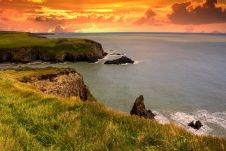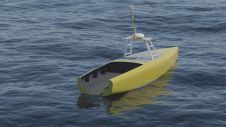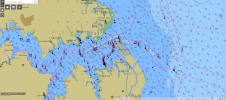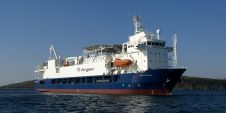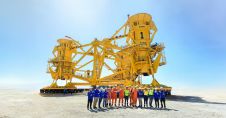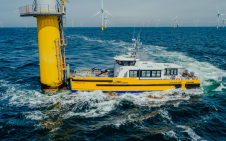Nutec Rotterdam BV
Safety training for seafarers
Every seafarer will, however unintentionally, shudder at the thought of having to abandon a ship in case of fire or any other kind of onboard incident whilst at sea. Hydrographers often form part of a ship’s company governed by the SOLAS-legislation. Training at nautical college and regular fire and lifeboat exercises are the answer to preventing danger. But how to deal with such emergency situations depends on the content, intensity and frequency of training and the ‘training regime’ onboard ships.
For over two decades Nutec Rotterdam BV has been offering safety training situations which are as realistic as possible. Situations are being imitated and practical exercises aimed at dealing with these situations are practiced. Thanks to this approach and influenced by international safety legislation contained in the International Convention on Standards of Training, Certification and Watch keeping for Seafarers (the STCW 95 convention), these courses have been developed into more than seventy different modules.
Nutec Rotterdam BV was established at the harbour of Vlissingen in 1986. In 1988 a new location was chosen on the western side of ‘The Maasvlakte’ near Rotterdam. The already established Rotterdam International Safety Centre (RISC, now Risc Fire & Safety BV) had the same practical approach as Nutec regarding education and training for industrial fire fighting and it was thus logical for Nutec to choose the same location. When the company came into the hands of the current owner, Mr Jan Hart, Nutec became focused on the extension of activities and co-oporation with RISC. This resulted in an increase in growth.
Flat Structure and Flexibility
The companies’ organisation of an establishment with such a variety of services would seem to be surprisingly simple. Under daily charge of operations manager Mr Eric Mayer, 21 full and part-time instructors give both theoretical and practical instruction to students of many different nationalities. Instructors develop their own personal specialities over the course of their employment, depending on their background and experience. Employees come from all sorts of different areas, such as the merchant shipping industry, the oil and gas industry, professional diving and the navy.
The Safety Agenda
Safety has over recent years occupied and more and more prominent place on the agenda of the (inter)national shipping industry. This is not only due to the shipping industry
affirming its necessity but also because of international maritime safety legislation developed and sharpened by the International Maritime Organisation (IMO).
The IMO demands that ship-owners make their business management crystal clear, both onboard and ashore, including the interaction between these aspects. Documents directly or indirectly important for the safety of ship, crew, environment and naval environment need to be well maintained. Safety training is also required to ensure that, for example, the functioning of the safety committee onboard is clear to all crew. Not only are safety exercises demanded, but also a thorough evaluation of their effectiveness. Points for improvement must be identified and audited. At the same time, IMO has made more severe demands on safety training.
STCW 95 Convention
Since 1st February 1997 the reviewed International Convention on Standards of Training Certification and Watch keeping for Seafarers (the STCW 95 convention) has been in force. And since February the conditions concerning education, certificates of competence, and watch-keeping work and rest times have been implemented. The STCW 95 convention is a revised edition of the STCW 78 convention providing, among other things, more strict and detailed demands concerning minimum knowledge and practical skills for seafarers. This is applicable to nautical training at nautical colleges, in addition to English language, safety conditions and knowledge concerning work and safety procedures, working areas and equipment onboard: so-called familiarisation.
Blueprint
The existing pre-sea training at Dutch nautical colleges comes under the title of Basic Training (STCW02). This is a standard course module identical all over the world, the contents having been shaped according to the new convention. This is why the four-day practical course consists of one and a half days fire fighting, including the use of breathing apparatus, two and a half days sea survival, first-aid and personal safety and social responsibilities. The demands in the STCW 95 convention for training are recorded in the so-called competence chart. Nutec Rotterdam BV was able to use this chart immediately to offer the course according to this new standard. New safety modules were also added to the training protocol, such as Advanced Fire fighting (STCW05). This does not primarily focus on elementary fire-fighting techniques but more on tactical management of emergency situations where fire plays a part. In this situation we deal with cases of most importance to captains and officers; for example, how to maintain clear communications between the person in charge and the teams, risk analysis and setting priorities and scenarios in which dangerous goods play a part.
Future of the Concept
The strategic objective of Nutec is to give safety training of high quality on all continents. Nutec Rotterdam already has establishments in Europe, Asia, Brazil and the Philippines. At all these centres we train according to the Nutec concept. The presence of Nutec in all of the countries surrounding North Sea enables us to offer courses covering all North-Sea requirements. This has become the Nutec standard and is accredited around the North Sea. It is expected that training standards will become mandatory on a worldwide scale. Consequently, the group is rapidly growing outside Europe.
The following points have a high priority when it comes to the development of our company:
- International expansion
- European expansion in existing business areas through organic growth and acquisitions
- Protection of market share in Scandinavia
- development of present business areas
- Expansion within new business areas
- Penetrating markets by cross-selling services.
For the future, the company sees possibilities in the following markets:
- Survival and safety training; e.g. safety training for maritime and oil & gas sector
- Preventative safety training, introducing safety awareness training, behaviour and culture programmes
- Crisis management and consultancy, offering clients in high-risk industries more advanced risk-prevention tools
- Profiling and analysis using Tripod Solutions: advanced (generic) analysis tools and methodology
- Competency management systems; safety is becoming a predominant factor in society and incidents are often attributable to human failure.

Value staying current with hydrography?
Stay on the map with our expertly curated newsletters.
We provide educational insights, industry updates, and inspiring stories from the world of hydrography to help you learn, grow, and navigate your field with confidence. Don't miss out - subscribe today and ensure you're always informed, educated, and inspired by the latest in hydrographic technology and research.
Choose your newsletter(s)

